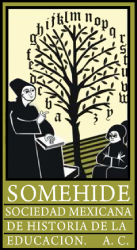Why am I a teacher? Testimonies of female normalist teachers on the profession of educating
DOI:
https://doi.org/10.29351/amhe.v2i2.338Keywords:
Normal School, teacher training, gender, life storiesAbstract
This paper is a continuation of the project “Social history and life stories. Education of women in Guanajuato in the second half of the 20th century”, with the research objective of contributing to this topic by documenting the life stories of women who had the opportunity to study in order to practice a profession. We highlight the female teachers here, making them visible with a gender perspective. In this paper, from a preamble to the normalistic tradition that has been maintained in Mexico (a history in which three generations are distinguished), and from the brief description of the prevailing training models of these institutions, we focus on the central point of the watershed that meant the presidential decree of Miguel de la Madrid (march 23, 1984), by which he transformed the normalistic studies granting them the status of degree. In those years, the pedagogical baccalaureate, compulsory preparatory for degree in education, also marked a brief milestone. Thus, we characterize the technical-efficient and reflex-hermeneutic approaches (with the academicist’s persistence), as guides in teacher training. We complement the investigation with the testimonies of female teachers. The sample, made up of proximity and convenience, integrates nine preschool and primary teachers, from public and private schools, especially form the state of Guanajuato –since we include the generous account of a teacher from Parral, Chihuahua.– The analysis, with support of the Maxqda software, allows us to affirm that the reasons for being teachers continue to be: an indisputable vocation to serve, share knowledge and influence the value formation of children so that they are good citizens. As women, they agree that being teachers was the best option and they would do it again for the satisfaction and personal fulfillment that it represents.
References
Arteaga, B., y Camargo, S. (2009). El surgimiento de la formación de docentes en México como profesión de Estado: Enrique C. Rébsamen y la creación de las primeras Escuelas Normales. Integra Educativa, 2(3). Recuperado de https://www.academia.edu/8996311/El_surgimiento_de_la_formaci%C3%B3n_de_docentes_en_M%C3%A9xico_como_profesi%C3%B3n_de_Estado_Enrique_C._R%C3%A9bsamen_y_la_creaci%C3%B3n_de_las_primeras_Escuelas_Normales.
Báez-Chávez, I. (2014). La feminización en las escuelas normales del Estado de México. Ra Ximhai, (10), 321-338.
Barreto, C., y Álvarez, M. E. (2013). Mujeres y docencia: una mirada desde la historia de vida contada por sus protagonistas. Saber, 25(1), 104-110. Recuperado de: http://ve.scielo.org/scielo.php?script=sci_arttext&pid=S1315-01622013000100012&lng=es&tlng=es.
BCENOG [Benemérita y Centenaria Escuela Normal Oficial de Guanajuato] (2020). Breve historia de nuestra institución. Recuperdo de: http://bcenog.edu.mx/pagina/nosotros/historia.html.
Bertely, M., y Alfonseca, J. (2008). Para una historiografía de la feminización de la enseñanza en México. Revista Mexicana de Investigación Educativa, 13(38), 981-997. Recuperado de: http://www.scielo.org.mx/scielo.php?script=sci_arttext&pid=S1405-66662008000300015&lng=es&tlng=es.
Bolívar, A. (2014). Las historias de vida del profesorado. Voces y contextos. Revista Mexicana de Investigación Educativa, 19(62), 711-734.
Cano, G. (2001). Mujeres de Occidente: reseña de Georges Duby y Michelle Perrot, Historia de las mujeres en Occidente. Letras Libres, 28, 78-80. Recuperado de: http://www.letraslibres.com/mexico/libros/historia-las-mujeres-en-occidente-george-duby-y-michelle-perrot.
Chávez, M. (2009). Pensar la educación desde la historia del magisterio femenino en el noreste de México. Revista Mexicana de Investigación Educativa, 42(14), 853-861.
Escuela Normal Oficial de Irapuato (s.f.). Historia. Recuperado de: https://sites.google.com/a/enoi.edu.mx/enoi/nuestra-escuela/historia.
Galván, L. E. (2017). La maestra Manuela Contreras y la importancia de la enseñanza de la costura. Ponencia presentada en el panel “Maestras y maestros de ayer que dejaron huella en la historia de la educación de hoy en México”, Memoria electrónica del XIV Congreso Nacional de Investigación Educativa, COMIE, San Luis Potosí, México.
Gobierno del Estado de Guanajuato (2019). Celebran 65 años de la ENOL. Recuperado de: https://boletines.guanajuato.gob.mx/2016/02/25/celebran-65-anos-de-la-enol/.
González, R. (2007). Las maestras en México. Re-cuento de una historia. México: Universidad Pedagógica Nacional.
Hernández, J. M. (2015). Modelos de formación de profesores en la España contemporánea. En M. Martín-Sánchez y T. Groves (eds.), La formación del profesorado. Nuevos enfoques desde la teoría y la historia de la educación (pp. 11-36). España: Ediciones FarhenHouse.
Imbernón, F. (1994). La formación del profesorado. Barcelona-México: Paidós.
Imbernón, F., y Canto, P. (2013). La formación y el desarrollo profesional del profesorado en España y Latinoamérica. Revista Electrónica Sinéctica, 41, 1-12.
López, O. (2003). Destinos controlados: educación y lectura en la Academia de Niñas de Morelia, 1886-1915 [Tesis de Doctorado]. CIESAS Occidente, México.
Medrano, V., Ángeles, E., y Morales, M. (2017). La educación Normal en México. Elementos para su análisis. México: INEE.
Pedraza, S. (2011). La educación de las mujeres: el avance de las formas modernas de feminidad en Colombia. Revista de Estudios Sociales, (41), 72-83. Recuperado de: http://www.redalyc.org/html/815/81522362006/.
Pujadas, J. (2000). El método biográfico y los géneros de la memoria. Revista de Antropología Social, (9), 127-158.
Downloads
Published
How to Cite
Issue
Section
License
Todos los contenidos del Anuario Mexicano de Historia de la Educación se publican bajo una licencia Creative Commons Atribución No Comercial 4.0 Internacional (CC BY-NC 4.0), que permite compartir (copiar y redistribuir el material en cualquier medio o formato) y adaptar (remezclar, transformar y construir a partir del material) para fines no comerciales, dando los créditos a los autores y a la revista, tal como lo establece la licencia.
La política de acceso abierto y de licencias con “algunos derechos reservados” no niega la propiedad intelectual ni los derechos de los autores respecto a sus artículos, pues ellos son los titulares, en tanto que el Anuario Mexicano de Historia de la Educación no los reserva para sí ni para la institución editora, ya que se apegan a movimientos de acceso abierto como los Principios y Valores del Sistema de Información Científica Redalyc - Red de Revistas Científicas de América Latina y el Caribe, que pugnan por la eliminación de las políticas de embargo para que el autor retenga los derechos de su obra (principio número 8). Así como las políticas de acceso abierto del Directory of Open Access Journals (DOAJ).
Los autores podrán distribuir su propio material en cualquier otro medio o soporte, siempre y cuando sea para fines no comerciales, informando a los editores que el trabajo será publicado nuevamente y dando el crédito correspondiente al Anuario Mexicano de Historia de la Educación.
La publicación en el Anuario Mexicano de Historia de la Educación, por su carácter gratuito, no da derecho a remuneración económica alguna a los autores, ni a los dictaminadores.
Los lectores podrán reproducir (copiar), comunicar, distribuir o hacer obras derivadas de los artículos o colaboraciones publicados en el Anuario Mexicano de Historia de la Educación en los siguientes casos:
- Para fines públicos.
- Sin fines comerciales.
- Que se reconozca la autoría de la obra y se cite su origen con información completa: Apellido/s del autor, inicial/es del nombre/s. (año de publicación). Título del artículo. Nombre de la revista, volumen (número de ejemplar), página inicial del artículo-página final del artículo. DOI o URL (formato sugerido de acuerdo al estilo APA en su versión más reciente).
El cuerpo editorial del Anuario Mexicano de Historia de la Educación asumirá el compromiso de notificar oportunamente a los autores sobre cualquier cambio de ubicación de los artículos en el sitio (cambio de dirección URL o de conexiones para identificar el artículo).
Los autores, al enviar sus trabajos para su posible publicación, deberán tomar en cuenta los puntos anteriores, mismos que se contemplan en el Acuerdo entre autor y el Anuario Mexicano de Historia de la Educación.












